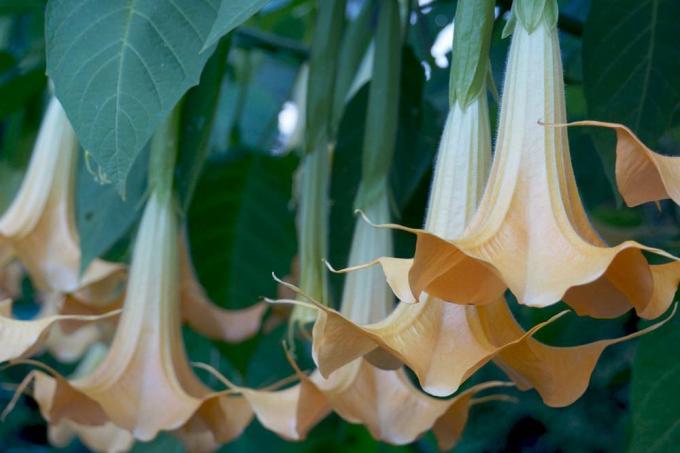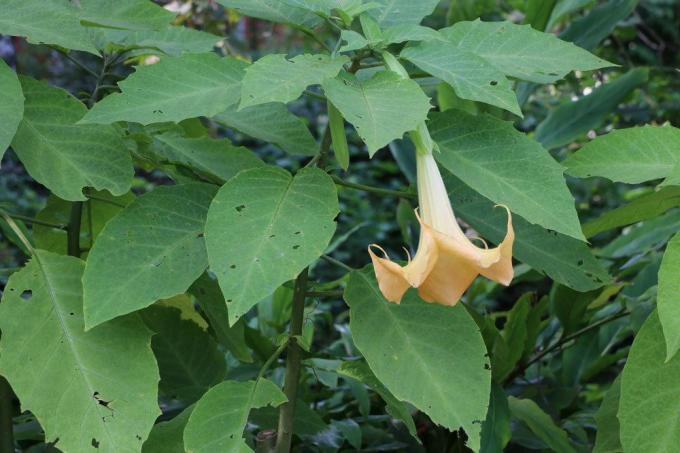
table of contents
- origin
- characteristics
- Surname
- Toxicity
- Toxins
- Risk of poisoning
- Symptoms of poisoning
- First aid
- Alternative plants
It is one of the 10 most poisonous plants in German gardens - the angel's trumpet. The decorative flowering plant with the characteristic long, mostly cream-colored calyxes is offered as a container plant for gardens, patios and balconies at weekly markets and in flower shops. But most flower lovers do not even know about the danger posed by the plant.
origin
Origin and characteristics: How to recognize the angel's trumpet
The angel's trumpet (lat. Brugmansia, Brugmansie, also Datura suaveolens or stramonium) belongs to the nightshade family and can grow up to 5 m high as a shrub or tree.
characteristics
Its 10-30 cm long, trumpet-shaped calyxes are available in various colors from white and cream to pink and orange to bright red. They open at dusk, close again in the morning and give off an intense smell. After the flowering period, the outer petals tend to fall off and the berries of the plant appear. Their strikingly large, alternately arranged leaves are ovate and tapering to a point, have a wavy edge and can be hairy or glabrous. Brugmansia bloom from July to October, and longer if the temperatures are favorable. They love it sunny and grow outside of the garden and the like. a. at the roadside and sometimes even on garbage dumps.
Surname
The common name angel's trumpet naturally refers to the shape of the flower and does not initially indicate that it is poisonous. But there are other popular terms such as thorn apple, devil's herb or poison apple. The Celts are said to have coated their arrowheads with the poisonous sap of the Datura, and in the past the plant was often planted in the garden to ward off moles.

Toxicity
An ornamental plant that has it all: How poisonous is the angel's trumpet?
All parts of the plants of the nightshade family are highly poisonous, especially roots and seeds. The contained alkaloids, such as scopolamine (up to 80%), hyoscyamine and atropine, which were already present at the beginning of the 19th century. Chemically isolated from the plant in the 20th century have a strong effect on the parasympathetic nervous system, dilate blood vessels, accelerate the heartbeat and affect the circulation.
Toxins
Consumption can therefore be life-threatening, and even the scent itself is said to cause symptoms of intoxication in individual cases with narcotic conditions, accompanied by headache, dry mouth, swollen tongue, nausea and vomiting to have. Deaths from undetected atropine poisoning by these and other alkaloid-containing plants are also documented. The plant, which is even assigned to intoxicants, should therefore not be touched if possible to prevent unwanted ingestion of plant secretions through the mucous membranes of the mouth, nose and eyes avoid.
Tip: Information on this and other poisonous plants is also available from the information center against poisoning in Bonn (under http://www.gizbonn.de/272.0.html)
Risk of poisoning
Warning: risk of poisoning, especially for children, adolescents and pets!
Due to the alkaloids it contains, Brugmansia poses a high risk of poisoning. Especially toddlers who like to put something in their mouth, pets who are unsuspecting about the plant nibble, or sick, old and weak people who do not know about the toxicity of the plant endangered. In addition, there are known cases in which young people wanted to test the hallucinogenic effects of plants as a drug - with serious consequences. In order to protect yourself and your loved ones, it is advisable either to forego the plant entirely or at least to take all necessary protective measures.
Tip: Regardless of whether you have angel's trumpet in the garden, you should definitely educate your immediate environment about the danger.

Symptoms of poisoning
Recognize symptoms of poisoning and react correctly
The symptoms caused by the angel's trumpet are well documented in relevant literature and can be caused by even the smallest amounts. These include a strong state of restlessness immediately after contact or consumption, confusion as well as vomiting and diarrhea, facial flushing and hot skin, dry mucous membranes, difficulty swallowing and hoarseness, dilated pupils and visual disturbances, palpitations and high pulse as well Seizures. Hallucinations can also occur, and a strongly sedating or paralyzing effect up to coma-like states is possible. The course can be fatal in the absence of medical care.
Note: An important measure after ingesting poisonous plants - it is imperative that you spit it out completely immediately and drink enough liquid.
First aid
In the case of poisoning of all kinds, act quickly! If the symptoms mentioned or other symptoms occur after contact with the plant (or even after consumption of parts of the plant), please visit the nearest clinic immediately. call the emergency doctor, making sure to indicate contact with the plant. The five W-questions are helpful here: Who, what, when, how, how much? If there are still parts of the plant, they can also be carefully packed and taken with you for precise identification.
Tip: If there is uncertainty about contact with poisonous plants when the symptoms are unclear, a Call to the local poison control center, which is available 24 hours a day for acute emergencies, saving lives be.
Alternative plants
It is better to switch to other ornamental plants
Due to the great potential risks that the angel's trumpet harbors, experts advise against to plant them in the home garden or on the balcony (or even in your own four walls to fetch). There are enough attractive alternatives among flowering plants that are not poisonous. It is best to get advice from a gardening specialist to be on the safe side.
Tip: If you don't want to do without the graceful, frost-sensitive plants in your own garden, you should at least well protected out of the immediate reach of children, adolescents, neighbors and animals cultivate. When caring for it, it is strongly recommended to wear protective gloves and not to smell the flowers too intensely.
Sources:
http://www.gizbonn.de/86.0.html



